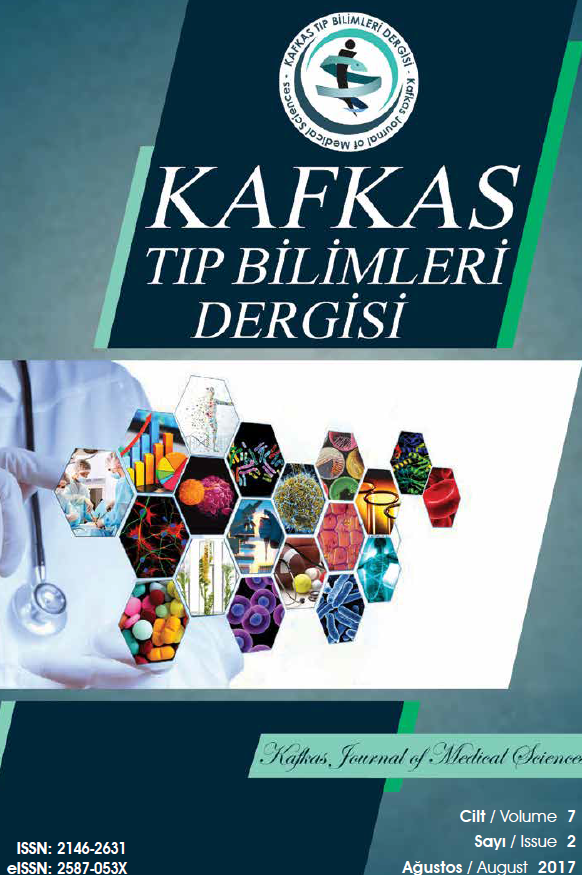COVID-19 Pandemisi Türkiye’nin Doğu Karadeniz Bölgesi’nde Çalışan Kadın Hemşirelerin Cinsel Davranışlarını Nasıl Etkiledi? Tanımlayıcı Bir Çalışma
hemşire, cinsel fonksiyon, menstruel bozukluk, kadın cinsel işlev ölçeği, kontrasepsiyon; COVID-19
How Did the COVID-19 Pandemic Affect the Sexual Behavior of the Female Nurses Working in the North-Eastern Black Sea Region of Turkey? A Descriptive Study
nurse, sexual function, menstrual disorder, female sexual function index, contraception; COVID-19,
___
- 1. World Health Organization. Director-General’s remarks at the media briefing on 2019-nCoV on 11 February 2020. Available at: https://www.who.int/dg/speeches/detail/who-directorgeneral-s-remarks-at-the-media-briefing-on-2019-ncov-on-11- february-2020. Date: 2020 (Verified January 5, 2021)
- 2. TC Sağlık Bakanlığı COVID-19 bilgilendirme platformu. Genel koronavirüs tablosu, 2021. Available at: https://covid19. saglik.gov.tr/TR-66935/genel-koronavirus-tablosu.html (Verified at April 20, 2021)
- 3. Lu W, Wang H, Lin Y, Li L. Psychological status of medical workforce during the COVID-19 pandemic: A cross-sectional study. Psychiatr Res. 2020;288:112936.
- 4. Montesi JL, Conner BT, Gordon EA, Fauber RL, Kim KH, Heimberg RG. On the relationship among social anxiety, intimacy, sexual communication, and sexual satisfaction in young couples. Arch Sex Behav. 2013;42(1):81–91.
- 5. Rokach A. The effect of psychological conditions on sexuality: A review. Psychopharmacology. 2019;29:259–266.
- 6. Wong TW, Yau JK, Chan CL, Kwong RS, Ho SM, Lau CC, et al. The psychological impact of severe acute respiratory syndrome outbreak on healthcare workers in emergency departments and how they cope. Eur J Emerg Med. 2005;12:13–18.
- 7. Hu D, Kong Y, Li W, Han Q, Zhang X, Zhu LX, et al. Frontline nurses’ burnout, anxiety, depression, and fear statuses and their associated factors during the COVID-19 outbreak in Wuhan, China: a large-scale cross-sectional study. Lancet. 2020;24:100424.
- 8. World Health Organization. Sexual and reproductive health: defining sexual health. Available at: https://www.who.int/ reproductivehealth/topics/sexual_health/sh_definitions/en/. Date: 2006. (Verified January 5, 2021)
- 9. Culha MG, Demir O, Sahin O, Altundere F. Sexual attitudes of healthcare professionals during the COVID-19 outbreak. Int J Impot Res. 2020;33(1):102–109.
- 10. Rosen R, Brown C, Heiman J, Lieblum C, Meston R, Shabsigh D et al. The female sexual function index (Fsfi): A multidimensional self-report instrument for the assessment of female sexual function. J Sex Marital Ther. 2000;26:191–205.
- 11. Aygin D, Eti Aslan F. The Turkish adaptation of the Female Sexual Function Index. Türkiye Klin J Med Sci. 2005;25:393– 399.
- 12. Yuksel B and Ozgor F. Effect of the COVID-19 pandemic on female sexual behavior. Int J Gynecol Obstet. 2021;33(1):131–136.
- 13. Micelli E, Cito G, Cocci A, Polloni G, Russo GI, Minervini A, et al. Desire for parenthood at the time of COVID-19 pandemic: an insight into the Italian situation. J Psychosom Obstet Gynecol. 2020;41:183–190.
- 14. Zhu C, Wu J, Liang Y, Yan L, He C, Chen L, et al. Fertility intentions among couples in Shanghai under COVID-19: A cross-sectional study. Int J Gynecol Obstet. 2020;151:399–406.
- 15. Phelan N, Behan LA, Owens L. The Impact of the COVID-19 Pandemic on Women’s Reproductive Health. Front Endocrinol (Lausanne)2021;12:642755.
- 16. Ju H, Jones M, Mishra G. The prevalence and risk factors of dysmenorrhea. Epidemiol Rev. 2014;36:104–113.
- 17. Mathew RJ, Largen JL, Claghorn JL. Biological symptoms of depression. Psychosom Med. 1979;41:439–443.
- 18. Omar SS, Dawood W, Eid N, Eldeen D, Munir A, Arafat W. Psychological and Sexual Health During the COVID-19 Pandemic in Egypt: Are Women Suffering More ? Sex Med. 2021;9:100295.
- 19. Fuchs A, Matonóg A, Pilarska J, Sieradzka P, Szui M, Czuba B et al. The impact of COVID−19 on female sexual health. Int J Environ Res Public Health. 2020;17:1–9.
- 20. Cocci A, Giunti D, Tonioni C, Cacciamani G, Tellini R, Polloni G, et al. Love at the time of the Covid-19 pandemic: preliminary results of an online survey conducted during the quarantine in Italy. Int J Impot Res. 2020;32(5):556–557.
- 21. Li G, Tang D, Song B, Wang C, Qunshan S, Xu C, et al. Impact of the COVID-19 Pandemic on Partner Relationships and Sexual and Reproductive Health: Cross-Sectional, Online Survey. J Med Internet Res. 2020;22: e20961.
- 22. Sampaio F, Sequeira C, Teixeira L. Impact of COVID-19 outbreak on nurses’ mental health: A prospective cohort study. Environ Res. 2021;194:110620.
- ISSN: 2146-2631
- Yayın Aralığı: Yılda 3 Sayı
- Başlangıç: 2011
- Yayıncı: Kafkas Üniversitesi
Akut Kalp Yetmezliğinde Uygulanan Tedavilerin Mortalite Üzerine Etkisi: Bir Gerçek Dünya Çalışması
Fatih KÖKSAL, Mustafa ALDEMİR, Fatih LEVENT, Sadık Volkan EMREN, Cem NAZLI
Osseöz Mallet Parmak Tedavisinde Konservatif Tedavinin Sonuçları: Retrospektif Olgu Serisi
Murat ALTAN, Mehmet DEMİREL, Ömer AYIK
Acil Tıp Uzmanlarının İlaç Uyumunun MMAS-8 Kullanılarak Değerlendirilmesi
Damla ANBARLI METİN, Arda KOCATAŞ
Gebelerde Travmaya Bağlı Tibia Kırıklarının Analizi
Ali Erkan YENİGÜL, Nefise Nazli YENİGÜL
Atakan YILMAZ, Gülay TAŞDEMİR YİĞİTOĞLU, Halis YILMAZ
Perkütan Endoskopik Gastrostomi: İkinci Basamak Hastanede Retrospektif Analiz
Sol Alt Kadran Ağrısının Nadir Bir Nedeni: İntestinal Malrotasyonlu Bir Hastada Akut Apandisit
Mesud FAKİRULLAHOĞLU, Nurhak AKSUNGUR
Nadir Bir Akut Karın Nedeni: Pnömatozis Sistoides İntestinalis
İbrahim Ethem GÜVEN, Batuhan BAŞPINAR, Rasim Eren CANKURTARAN, Ertuğrul KAYAÇETİN
Hemşirelik Öğrencilerine Verilen Eğitimin Palyatif Bakım Bilgi ve Tutumlarına Etkisi
